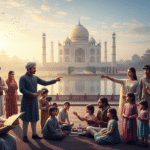Faith and Sacrifice: A Question of Ethics and Unity in Modern Rituals
In the quiet hills of Uttarakhand, a temple priest rings the bell, signaling the start of a sacred ritual. Nearby, a goat, adorned with a garland, awaits sacrifice as part of a centuries-old tradition. Meanwhile, in a bustling city mosque, a family prepares for Qurbani (sacrificial slaughter) during Eid al-Adha, a practice rooted in the teachings of the Quran. Across cultures and religions, rituals have long been a way to connect with the divine. But as ethical debates intensify, a question arises: Are these rituals uniting us in shared meaning, or are they creating divisions based on tradition, belief, and morality?
The Ethics of Sacrifice
Ritual animal sacrifice, practiced in various religions, has come under scrutiny in recent years. Critics argue that such acts, though deeply symbolic, clash with modern ethical and environmental values.
- Hindu Practices:
In parts of India, animal sacrifices are offered to deities like Kali or Durga as acts of devotion and purification. Temples in West Bengal, Assam, and Uttarakhand continue this practice, despite growing opposition from animal rights activists. In 2020, the Uttarakhand High Court upheld a ban on animal sacrifice in public religious spaces, citing cruelty concerns. - Islamic Qurbani:
During Eid al-Adha, Muslims worldwide perform Qurbani, a ritual slaughter commemorating Prophet Ibrahim’s willingness to sacrifice his son as an act of obedience to God. The practice is deeply symbolic but has faced criticism from animal welfare groups, especially in urban areas where the ritual’s visibility can spark debates. - Other Traditions:
Similar rituals exist in other faiths. In Christianity, the concept of Jesus as the “Lamb of God” ties deeply to the symbolism of sacrifice, while indigenous tribal rituals in India and Africa often involve offerings to spirits or ancestors.
Unity in Rituals
Rituals, including animal sacrifice, are deeply rooted in collective identity, creating bonds within communities:
- Shared Purpose:
For many, participating in such rituals fosters a sense of belonging and shared values. During Eid al-Adha, the distribution of meat from Qurbani among family, neighbors, and the poor emphasizes charity and community. - Cultural Continuity:
Rituals preserve traditions passed down through generations, connecting the present with the past. In tribal communities, animal sacrifice often symbolizes respect for nature and ancestors, reinforcing collective memory.
The Divisive Impact
While rituals aim to unite, they often spark divisions along ethical, cultural, and religious lines:
- Ethical Concerns:
The question of whether sacrificing living beings is justified has become increasingly polarizing. Organizations like PETA India and People for Animals argue that such practices violate modern animal welfare standards and call for humane alternatives. - Religious Intolerance:
Rituals involving animal sacrifice have occasionally fueled communal tensions. For example, calls to ban Qurbani during Eid in certain regions have led to clashes, with critics labeling the practice as barbaric and defenders emphasizing religious freedom. - Generational Divide:
Younger generations, influenced by global ethical movements and environmental awareness, are often critical of traditional rituals. This creates a divide within families and communities, where elders may view such questioning as a rejection of cultural heritage.
Are Alternatives Possible?
Many communities and leaders are exploring ways to adapt rituals to align with modern sensibilities:
- Symbolic Sacrifices:
In some Hindu temples, rituals involving animal sacrifice have been replaced with offerings of coconuts or other symbolic substitutes. Similarly, a growing number of Muslims in urban areas are opting for virtual Qurbani, donating money to charities that distribute meat without local slaughter. - Promoting Awareness:
Religious leaders and scholars are engaging in dialogues about the ethical and spiritual dimensions of sacrifice, emphasizing intention over action. This approach encourages communities to adapt without abandoning the essence of their traditions.
The Bigger Question
At its heart, the debate over rituals like animal sacrifice reflects a larger question about the role of tradition in a rapidly changing world. Do these practices connect us to shared values of faith and community, or do they perpetuate divisions based on outdated norms?
Conclusion: A Path Forward
Rituals, including those involving sacrifice, are deeply personal and cultural practices. While they offer a sense of connection and continuity, they must also evolve to address contemporary ethical and social concerns. Open dialogue, mutual respect, and a willingness to adapt can ensure that rituals remain a source of unity rather than division.
As India continues to navigate its rich tapestry of faiths and traditions, the challenge lies in preserving the spirit of rituals while addressing the ethical and moral questions they raise in today’s world. In this delicate balance, perhaps the true essence of spirituality—compassion, empathy, and shared humanity—can shine through.






